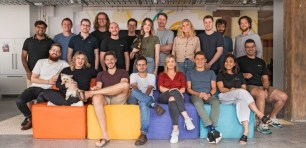
Tech Council of Australia chief executive Kate Pounder. Source: supplied.
A group of Australian tech industry heavyweights have formed a new industry body and lobby group, in a move that represents a maturing of the local ecosystem, according to new chief executive Kate Pounder.
The Tech Council of Australia is chaired by Tesla chair Robyn Denholm, with other board members including the likes of Atlassian’s Scott Farquhar, Afterpay’s Anthony Eisen, :Different’s Mina Radhakrishnan, Culture Amp’s Didier Elzinga and Canva’s Cliff Obrecht.
The group is headed up by Pounder — formerly the managing director of Accenture — as chief executive.
Founding members include Microsoft and Google, as well as local VC firms Blackbird, Airtree and Main Sequence, and tech leaders such as Airtasker, RedBubble and 99designs.
The council represents something of an evolution of previous industry body StartupAus, which has now merged with the Tech Council. Former StartupAus chief Alex McCauley also sits on the board, having relocated to the US to study.
It also recognising the growing economic contribution of the tech sector to the Australian economy.
Accenture, in a report released in conjunction with the launch, calls the Australian tech sector a ‘critical’ part of the economy, contributing $167 billion to GDP in the 2021 financial year. That made it the third-highest contributing sector.
There are currently some 861,000 people employed in tech jobs.
However, the report suggests that despite a string of success stories, the sector here is falling behind, compared to that in other comparable countries.
That’s something the new council is looking to turn around, and fast.
It is targeting 1 million tech-related jobs in Australia by 2025, and a $250 billion annual contribution to GDP by 2030.
Entrepreneurs giving back
Speaking to SmartCompany, Pounder stresses that this is not only a sector of importance, it’s a sector with great promise.
We’re just getting started. So, it’s important to have a single voice “that can work constructively with governments in particular to make sure that we keep the right conditions for growth in place”.
Pounder says the council was the “brainchild” of McCauley, who in his tenure saw fledgling startups blossom into huge tech companies in their own right.
“He saw that maturation in the sector and felt the industry body needed to mature with it,” Pounder explains.
But she also stresses there will be continued support for emerging startups. In fact, it’s something that’s close to the hearts of the tech leaders sitting on the board.
“They know what they went through to build companies,” she says.
“They really want to give back to the sector and help that next wave of Australian entrepreneurs.”
The council will continue to publish the StartupAus Crossroads report, while an affiliate membership program will cater to earlier-stage companies.
Pounder also recognises that if the council is successful in influencing new policy, those businesses will quickly become medium-sized and large companies.
“We want a model that helps companies through their lifecycle,” Pounder says.
When asked about her immediate priorities, Pounder says the number one point of order was to set a goal. That is, creating 1 million tech-related jobs by 2025 and contributing $250 billion in value to GDP by 2030.
The team’s focus will be on creating a roadmap to achieve this, she says.
“We want to see it done now.”
“There’s more we can do”
This isn’t a government well known for its support of the tech sector. But Pounder suggests the tide is turning, and that the tech sector is “absolutely” starting to be recognised as a driver of economic growth.
The launch of the council has been welcomed by the Prime Minister and other leaders on both sides of politics, she says, with both major parties expressing a desire to work constructively with the group.
“There is genuine excitement in government as well as in industry about what Australia is capable of,” she says.
She also points to recent reform in employee share schemes as a “really positive” policy development.
That’s the kind of thing that allows early startup employees to leave their roles with enough cash in their pockets to build something themselves, she notes.
Tax incentives for early-stage venture capital firms are also a step in the right direction.
That said, “we also think there’s more we can do”.
There’s room for improvement in frameworks to incentivise financing of tech companies, she notes. And while she’s not concerned that Australia will be able to create 1 million tech jobs, there is a question as to whether we will fill them.
“Working with governments and communities and the education sector to make sure we’ve got people excited about tech jobs and understanding the pathways into them is really critical.”
Part of the Tech Council’s plans will also be around improving understanding of the tech sector among the general public, Pounder explains.
“A lot of people don’t appreciate the significant contribution it is making today; they don’t appreciate the job opportunities that exist,” she says.
“Helping Australians know what’s possible is also an important goal.”
Handpicked for you

Dovetail bags $5 million in funding from cohort of influential Aussie leaders



COMMENTS
SmartCompany is committed to hosting lively discussions. Help us keep the conversation useful, interesting and welcoming. We aim to publish comments quickly in the interest of promoting robust conversation, but we’re a small team and we deploy filters to protect against legal risk. Occasionally your comment may be held up while it is being reviewed, but we’re working as fast as we can to keep the conversation rolling.
The SmartCompany comment section is members-only content. Please subscribe to leave a comment.
The SmartCompany comment section is members-only content. Please login to leave a comment.